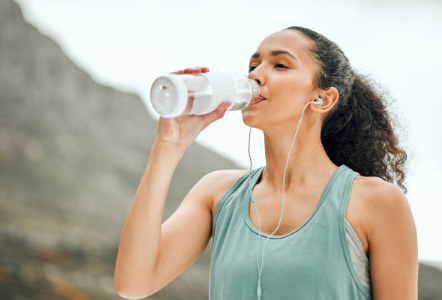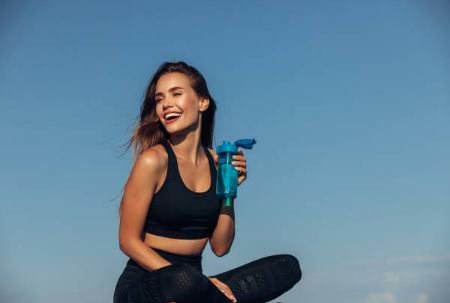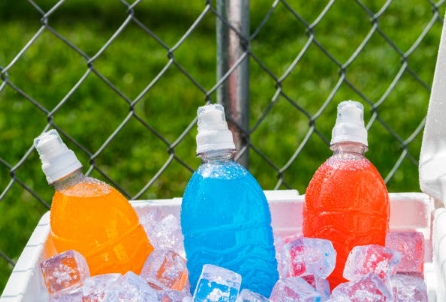60% of the body is made up of water. When you exercise, you can lose a lot.
Drinking water helps joints and body tissues function, regulate body temperature, and deliver nutrients. But Nancy Clark, a sports nutritionist and author of the book “Nancy Clark’s Guide to Sports Nutrition,” says some of us don’t drink enough water.

Before choosing the perfect drink to stay hydrated during your next workout, here’s what you should know.
Choose the Right Drink
Sometimes, the simplest solution is the best, and the same is true when it comes to choosing a workout drink.
“If you’re a regular person, it’s okay to drink water after a workout,” Clark says.
But if your workout is more intense and you spend more than three hours at a time, then Clark recommends Chocolate Milk.
“[Chocolate milk] contains sodium and calcium, which we lose when we sweat. It also contains carbohydrates, which can replenish energy and provide energy, and the protein also helps repair any damage.”
If you don’t like milk or water, sports drinks, coconut water, or other beverages will also work. Don’t worry too much about electrolytes. Clark said food can provide food for those who are lost by sweating.
Consume in Moderation
There are no rules about how much water you should drink during a workout, Clark said, and he advises you to “drink until you’re thirsty.”
But there are ways to calculate sweat rate, which includes weighing before and after a run and doing some calculations. If you shed a quart of sweat in an hour, you should drink about eight ounces of water every 15 minutes, Clark says.
If you want to skip the math and tend to sweat profusely, sweating 15 to 20 ounces every 4 to 8 minutes during your workout is a good rule of thumb.

Don’t Drink Too Much
It is possible to drink too much fluid, although this is uncommon. In marathons and triathlons, the risk is even greater.
Athletes who consume large amounts of fluids (even sports drinks) but do not have enough sodium may develop a potentially life-threatening condition called hyponatremia. Symptoms of hyponatremia include:
- Nausea or vomiting
- Headache, confusion, or fatigue
- Low blood pressure
- Loss of energy
- Muscle weakness, twitching, or cramping
- Seizures or coma
- Irritability or grumpy
But in reality, overhydration is “rare,” says Clark, who notes that most people don’t drink enough fluids while exercising.
Supplement with Some Protein and Carbohydrates
While exercising is good for you, it often causes minor cell or tissue damage after a workout. Protein can help repair any damage, so Clark recommends drinking protein-rich beverages to stay hydrated after strenuous exercise.
But it’s not just about protein, Clark says. Because you use a lot of energy while exercising, “you need three times as many carbohydrates as protein,” so Clark recommends flavored milk as a liquid alternative.
Know the risk of dehydration
Many problems can be caused by not drinking enough water. Perhaps one of the most common causes is fatigue.

Clark points out that if you don’t drink enough water, then “your blood will become more viscous with lower water content, and your heart will have to work harder, which means you will feel tired”. “People who are dehydrated get tired. ”
Drink Water Before and During Exercise
Clark recommends drinking water before you start a workout, especially if you’re doing something that requires a lot of stamina.
“Before running a marathon, you need to start drinking for about a half to two hours,” Clark said.
Also, it’s a good idea to drink water during your workout.
“We don’t drink enough while we’re exercising, and that can leave you in trouble after the workout, and then you have to rehydrate,” Clark said. “If you don’t let yourself get into this situation in the first place, that’s even better. ”
While carrying water while it can be a hassle to carry water while running, it’s worth it, Clark said.
Conclusion
Exercise has many benefits for our body, but losing water is one of the side effects. It’s important to stay hydrated at all times, especially when exercising.
Proper hydration is key to preventing dehydration. Tips on how much fluid to bring, when to bring, and what to bring should help you feel your best while exercising.